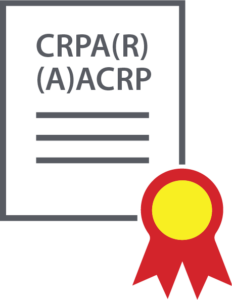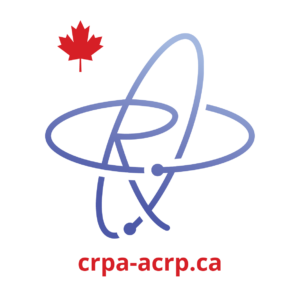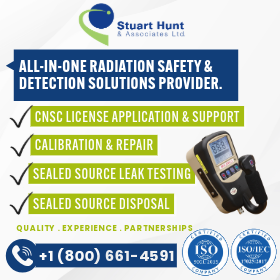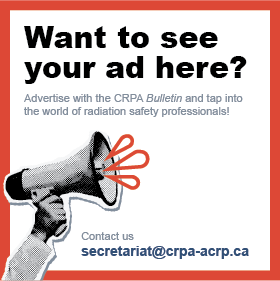CRPA(R) Prep, February 2024
An Interview with a CRPA(R) Explores Opportunities for Professional Development, Community Building, and Career Advancement
By Grant Cubon
 CRPA offers a Registered Radiation Safety Professional designation. Registered members who obtain the designation can use the letters CRPA(R) after their signature.
CRPA offers a Registered Radiation Safety Professional designation. Registered members who obtain the designation can use the letters CRPA(R) after their signature.
As an employer of radiation safety specialists, I include a CRPA(R) designation as a “nice to have” in job postings. I have always seen value in having staff at our facility who have obtained and maintain their designation. They learn quickly, solve problems promptly, and maintain a very good radiation protection program for our facility.
The accreditation through CRPA
- provides a healthy understanding of general radiation protection principles and practical applications,
- provides a mechanism for professional development and growth, and
- allows participants to build a network of colleagues in radiation protection.
But what do the CRPA(R)s think? I asked some CRPA(R) certified colleagues what benefits they saw in the designation. Following is the first in a series of responses.

Darin Street
Radiation protection and control lead, Canadian Light Source Inc.
What is your current position and role?
I am the radiation protection and control lead at the Canadian Light Source (CLS) Synchrotron in Saskatoon, SK. I’m responsible for coordinating a team that oversees the radiation protection program at the facility. This includes, among other things, dosimetry, radioactive material management, safety system testing and verification, radiation monitoring, and training and documentation of processes/procedures for radiation work.
How did you get started in radiation protection?
I had a summer student job back in 1998 with the University of Saskatchewan’s Waste Management Facility. I helped with the collection, storage, and disposal of radioactive waste on campus. That summer job turned into a year and half working as a full-time hazardous waste technician. I found the radioactive handling side of the job to be the most interesting.
In the summer of 2001, I worked as part of a team tasked with cleaning up a radioactive storage site owned by the Saskatchewan Accelerator Lab. It was to become the linear accelerator electron source for the new CLS facility that had just broken ground the previous year. The project involved surveying and cataloging over 1,000 pieces of material to determine the disposal options. It was this project that really piqued my interest in a potential career in radiation protection.
After working as a hazardous waste technician and emergency spill response specialist for seven years, I was lucky enough to get back into the radiation protection field when I was hired by the CLS as a radiation protection technician in 2010. I transitioned into my current role as the radiation protection lead within CLS’s Health, Safety, and Environment Department in 2013.
Is a CRPA(R) designation required for your job?
A CRPA(R) designation is not required for my position; however, it has been strongly encouraged as a platform for growth and professional development in radiation protection. CLS has supported me in obtaining and maintaining my designation.
When did you get your CRPA(R) designation?
I applied for and successfully wrote the CRPA(R) exam at the 2018 CRPA conference in Québec City.
Why did you pursue a CRPA(R) designation?
There are other designation for registered radiation safety professionals outside of Canada. However, the CRPA(R) was the most appealing to me because of the focus on Canadian regulations and standards, which are relevant to my role at the CLS. The CRPA community has an excellent working relationship with the Canadian Nuclear Safety Commission (CNSC), which allows for collaboration within the Canadian applicability of radiation protection.
What benefits do you see in having a CRPA(R) designation?
There are several benefits:
- A supportive community that can be called upon if you are struggling through a radiation protection problem—often other CRPA(R)s have been through or heard of a situation/issue that you are experiencing. This is an excellent way to get advice on something.
- A way to expand your knowledge of radiation protection through the different areas of professional development training.
- Opportunities to network, learn, and get to know colleagues throughout Canada with varying degrees of experience, expertise, and knowledge in radiation protection.
- Accreditation as a Registered Radiation Safety Professional (RRSP), which verifies the competency of your radiation protection knowledge and creates career advancement opportunities.
Would you recommend getting a CRPA(R) to others interested in radiation protection?
Yes, I would certainly recommend a CRPA(R) designation. However, those wishing to obtain the designation need to understand that personal commitment as well as support from your employer are needed to maintain the designation. Preparation for the exam is required, and you need to keep up your maintenance points on a three-year cycle.
Do you want to read more articles like this?
The Bulletin is published by the Canadian Radiation Protection Association (CRPA). It’s a must-read publication for radiation protection professionals in Canada. The editorial content delivers the insights, information, advice, and valuable solutions that radiation protection professionals need to stay at the forefront of their profession.
Sign up today and we’ll send you an email each time a new edition goes live. In between issues, check back often for updates and new articles.
Don’t miss an issue. Subscribe now!
Subscribe



